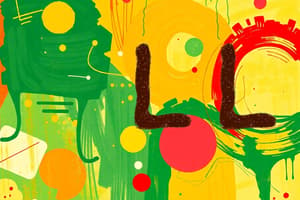Podcast
Questions and Answers
What does CLIL stand for?
What does CLIL stand for?
Content and Language Integrated Learning
Who are the authors of the book on CLIL?
Who are the authors of the book on CLIL?
Do Coyle, Philip Hood, David Marsh
CLIL is only relevant to language subjects.
CLIL is only relevant to language subjects.
False (B)
What is one main issue for assessment in CLIL?
What is one main issue for assessment in CLIL?
Which of the following are driving forces behind CLIL? (Select all that apply)
Which of the following are driving forces behind CLIL? (Select all that apply)
CLIL integrates ______ learning and language learning.
CLIL integrates ______ learning and language learning.
What is a shared vision for CLIL?
What is a shared vision for CLIL?
What issues are addressed in chapter 6 of the book?
What issues are addressed in chapter 6 of the book?
What is one of the future directions mentioned for CLIL?
What is one of the future directions mentioned for CLIL?
Flashcards are hidden until you start studying
Study Notes
Content and Language Integrated Learning
- This book is about CLIL (Content and Language Integrated Learning)
- It was written by Do Coyle, Philip Hood, and David Marsh
- The book is aimed at professionals in education
Key Concepts
- CLIL involves learning subject content through a foreign language
- CLIL is driven by various factors, including globalization and changing language needs
- It's relevant to contemporary education as it aims to improve both language and content skills
- CLIL is also beneficial for teachers because it provides a structured and effective approach to language development
Curricular Variation in CLIL
- There are many ways to implement CLIL depending on the scale and context
- Examples include:
- Partial immersion (some subjects taught in a foreign language)
- Full immersion (all subjects taught in a foreign language)
- Bilingual education (two languages are used for instruction)
CLIL as a Theoretical Concept
- CLIL bridges content and language learning, connecting them for a more holistic learning experience
- It emphasizes both language learning and language use for effective communication
- It goes beyond cultural awareness and aims for intercultural understanding
- By integrating content and language, CLIL promotes deeper learning and understanding
CLIL Toolkit: Transforming Theory into Practice
- Includes stages:
- A shared vision for CLIL
- Analyzing and personalizing the CLIL context
- Planning a unit
- Preparing the unit
- Monitoring and evaluating CLIL in action
- Next steps: Towards inquiry-based professional learning communities
Evaluating and Creating Materials for CLIL Classrooms
- Factors that influence the evaluation and design of materials
- Evaluating, assembling, and modifying existing materials
- Creating new materials to suit specific needs and learning objectives
Assessment Issues in CLIL
- The main issues for assessment in CLIL
- Examples of assessment practices
- Peer- and self-assessment
- Summary of assessment principles
Evaluating the Impact of CLIL Programs
- Immersion research is a relevant source for evaluating CLIL programs
- A template for evaluating the impact of CLIL programs is provided
Future Directions
- Globalization and change are influencing the direction of CLIL
- Integrating language across the curriculum is a vital component
- Sustainability and teacher education are crucial for the success of CLIL
- Growth of teacher-led learning communities is essential for fostering collaboration and knowledge sharing
- Expanding evidence-based research is necessary to further enhance CLIL practices and outcomes
Studying That Suits You
Use AI to generate personalized quizzes and flashcards to suit your learning preferences.




